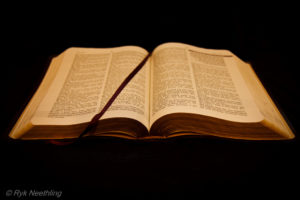 In the early church and up through the Dark Ages (then starting again with the Protestant Reformation), the preaching of the Word was the central focal point of the gathering of God’s people for worship. This is not to diminish the other aspects that compose a worship service. Music is very important for setting the tone of worship and Scripture is replete with instances of how music has been utilized by God’s people in worship. The words we sing direct our hearts toward the Object of our praise (which is why, by the way, we should be very careful with what songs we choose to sing). Corporate prayer is critical as well, as the Body comes humbly but boldly before the throne of grace (Heb. 4:16). Yet the proclamation of the Word is what has held the place of primary importance since the Apostles. It is with great disappointment, then, when we hear a pastor, particularly a very popular and well-publicized pastor (Andy Stanley), suggest that defending the Bible in its entirety is not necessary and is indeed too great a burden. Sadly, these are not the first comments on the matter this pastor has made; in the past, he has also said that expository preaching is the domain of the lazy preacher and that preachers ought to quit saying, “The Bible says…” simply because people today don’t accept the Bible’s authority. While many look toward his ministry quite favorably, I have always been more than a little cautious, because these kind of statements have been a hallmark of his for many years. Now, they are simply becoming more pronounced.
In the early church and up through the Dark Ages (then starting again with the Protestant Reformation), the preaching of the Word was the central focal point of the gathering of God’s people for worship. This is not to diminish the other aspects that compose a worship service. Music is very important for setting the tone of worship and Scripture is replete with instances of how music has been utilized by God’s people in worship. The words we sing direct our hearts toward the Object of our praise (which is why, by the way, we should be very careful with what songs we choose to sing). Corporate prayer is critical as well, as the Body comes humbly but boldly before the throne of grace (Heb. 4:16). Yet the proclamation of the Word is what has held the place of primary importance since the Apostles. It is with great disappointment, then, when we hear a pastor, particularly a very popular and well-publicized pastor (Andy Stanley), suggest that defending the Bible in its entirety is not necessary and is indeed too great a burden. Sadly, these are not the first comments on the matter this pastor has made; in the past, he has also said that expository preaching is the domain of the lazy preacher and that preachers ought to quit saying, “The Bible says…” simply because people today don’t accept the Bible’s authority. While many look toward his ministry quite favorably, I have always been more than a little cautious, because these kind of statements have been a hallmark of his for many years. Now, they are simply becoming more pronounced.
Ultimately, a pastor must determine where he stands in relation to the Word, which will consequently determine his approach to the centrality of the Word in worship. First, he may determine that he stands above Scripture. In this case, the pastor is the authority, not the Word of God, and he determines the meanings of the words of Scripture. This is the postmodern approach, where it is not interpretation so much as it is manipulation. Second, he may determine that he stands beside Scripture. With this view, the pastor relegates the Word to a status that is equal to other sources. This is the theological liberal’s approach, who declares that the Bible is not the Word of God but rather is nothing more than a reporter’s account of the Word. The third position is that he may determine that he stands under Scripture. Here, the Word of God is the authority and as such, must be proclaimed faithfully since it is the only way we can know about who God is and what He has done for us in Christ. As Paul wrote in Romans 10:17, “So faith comes from hearing, and hearing through the word of Christ.”
In our worship services here at Faith, we place the proclamation of the Word at the very center of everything we do. Scripture is the measure by which we evaluate the songs we sing; Scripture informs how we pray; and Scripture alone provides the substance of what we preach. As the society in which we live continues to become more and more post-Christian, many churches and church leaders will be tempted to shift the primacy of Scripture ever so slightly so as to attract more people in light of dwindling numbers. Yet the only hope we have of seeing people repent and believe in Jesus Christ as their Lord and Savior and of seeing believers grow stronger and more mature in their faith is through the careful, faithful preaching of the Word (II Timothy 4:2). Brothers and sisters, please pray for me (as well as all the Elders of the church) that this focus never changes. Just something to think about…

0 Comments